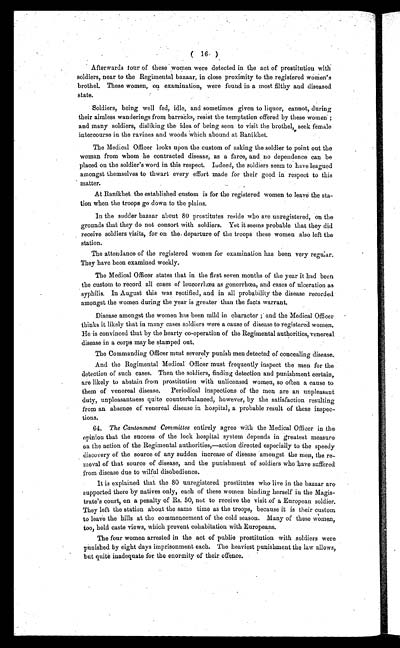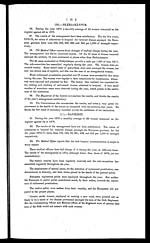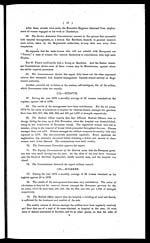Medicine - Institutions > Lock hospitals > Annual report on the working of the lock hospitals in the North-Western Provinces and Oudh > Sixth annual report of the working of the lock hospitals in the North-Western Provinces and Oudh, for the year 1879
(206) Page 16
Download files
Individual page:
Thumbnail gallery: Grid view | List view

(16 )
Afterwards four of these women were detected in the act of prostitution with
soldiers, near to the Regimental bazaar, in close proximity to the registered women's
brothel. These women, on examination, were found in a most filthy and diseased
state.
Soldiers, being well fed, idle, and sometimes given to liquor, cannot, during
their aimless wanderings from barracks, resist the temptation offered by these women ;
and many soldiers, disliking the idea of being seen to visit the brothel, seek female
intercourse in the ravines and woods which abound at Ranikhet.
The Medical Officer looks upon the custom of asking the soldier to point out the
woman from whom he contracted disease, as a farce, and no dependence can be
placed on the soldier's word in this respect. Indeed, the soldiers seem to have leagued
amongst themselves to thwart every effort made for their good in respect to this
matter.
At Ranikhet the established custom is for the registered women to leave the sta-
tion when the troops go down to the plains.
In the sudder bazaar about 80 prostitutes reside who are unregistered, on the
grounds that they do not consort with soldiers. Yet it seems probable that they did
receive soldiers visits, for on the departure of the troops these women also left the
station.
The attendance of the registered women for examination has been very regular.
They have been examined weekly.
The Medical Officer states that in the first seven months of the year it had been
the custom to record all cases of leucorrhœa as gonorrhœa, and cases of ulceration as
syphilis. In August this was rectified, and in all probability the disease recorded
amongst the women during the year is greater than the facts warrant.
Disease amongst the women has been mild in character ; and the Medical Officer
thinks it likely that in many cases soldiers were a cause of disease to registered women.
He is convinced that by the hearty co-operation of the Regimental authorities, venereal
disease in a corps may be stamped out.
The Commanding Officer must severely punish men detected of concealing disease.
And the Regimental Medical Officer must frequently inspect the men for the
detection of such cases. Then the soldiers, finding detection and punishment certain,
are likely to abstain from prostitution with unlicensed women, so often a cause to
them of venereal disease. Periodical inspections of the men are an unpleasant
duty, unpleasantness quite counterbalanced, however, by the satisfaction resulting
from an absence of venereal disease in hospital, a probable result of these inspec-
tions.
64. The Cantonment Committee entirely agree with the Medical Officer in the
opinion that the success of the lock hospital system depends in greatest measure
on the action of the Regimental authorities,—action directed especially to the speedy
discovery of the source of any sudden increase of disease amongst the men, the re-
moval of that source of disease, and the punishment of soldiers who have suffered
from disease due to wilful disobedience.
It is explained that the 80 unregistered prostitutes who live in the bazaar are
supported there by natives only, each of these women binding herself in the Magis-
trate's court, on a penalty of Rs. 50, not to receive the visit of a European soldier.
They left the station about the same time as the troops, because it is their custom
to leave the hills at the commencement of the cold season. Many of these women,
too, hold caste views, which prevent cohabitation with Europeans.
The four women arrested in the act of public prostitution with soldiers were
punished by eight days imprisonment each. The heaviest punishment the law allows,
but quite inadequate for the enormity of their offence.
Set display mode to: Large image | Zoom image | Transcription
Images and transcriptions on this page, including medium image downloads, may be used under the Creative Commons Attribution 4.0 International Licence unless otherwise stated. ![]()
| Permanent URL | https://digital.nls.uk/75111450 |
|---|




